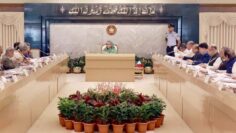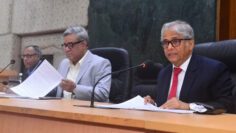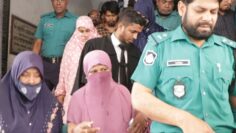Both formal and informal diplomacy needed to solve Rohingya problem: Speakers
PBC News: Speakers at a webinar on Sunday said that backchannel diplomacy should get involved, along with the official one, to mount greater international pressure on Myanmar to take back the Rohingya refugees from Bangladesh.
They said that informal and unofficial channels, known as Track 2 Diplomacy, can help in finding a sustainable return of the Rogingyas to their land in Rakhine state of Myanmar, reports UNB.
They also urged all stakeholders to ensure human dignity of the Rohingya community and their social cohesion with the locals until the repatriation.
Cox’s Bazar CSO NGO Forum (CCNF), a network of 50 NGOs working in Cox’s Bazar, orginised the virtual seminar on the occasion of World Refugee Day titled ‘World Refugee Day: Together We Heal, Learn and Shine’.
The webinar was jointly moderated by two Co-Chairs of CCNF Rezaul Karim Chowdhury, Executive Director COAST Foundation, and Abu Morshed Chowdhury, Executive Director-PHALS.
Arifur Rahman, Chief Executive YPSA, Bimal Chandra Dey Sarker, Chief Executive Mukti Cox’s Bazar, Abul Kashem, Executive Director of HELP Cox’s Bazar, Zahangir Alam, Member Secretary of CCNF, and Assistant Director of COAST Foundation placed specific interventions on behalf of the organizers.
Among others, Shireen Huq of Naripakkha, Gowhar Nayeem Waha of Disasater Forum, Manuel Moniz Pereira of IoM in Coxsbazar, Pius Mbaya Mulonzya of NGO Platform Coordinator, Soo Jin Rhee, Deputy Representative, UNHCR spoke at the occasion.
In his speech, Abu Murshed Chowdhury said Myanmar holds the main responsibility to ensure sustainable repatriation of the Rohingya people.
He said backchannel initiatives can work well along with UN initiative and government to government diplomacy for a sustainable solution to this problem.
Bimal Dey Sarker said Rohingya youths should be given skill-based education so that they get sustainable employment on return home.
Shireen Haq said localization of aid is a rational demand. Unfortunately, we can see very little development in ensuring localization.
Gowhar Nayeem Wahra said groundwater exploration must be stopped immediately.
He said rainwater harvesting can be a successful option in this regard. Instead of an LPG gas cylinder, a rice husk-based cooking solution should be promoted. Establishing small-scale factories for this can be helpful in employment generation for the local people, he said.
Manuel Moniz Pereira said total dependency on humanitarian support is not a sustainable solution. Demand-based economic cooperation and communication among the Rohingya and host communities need to be promoted. Afforestation should be encouraged and agroforestry should also get attention.


















